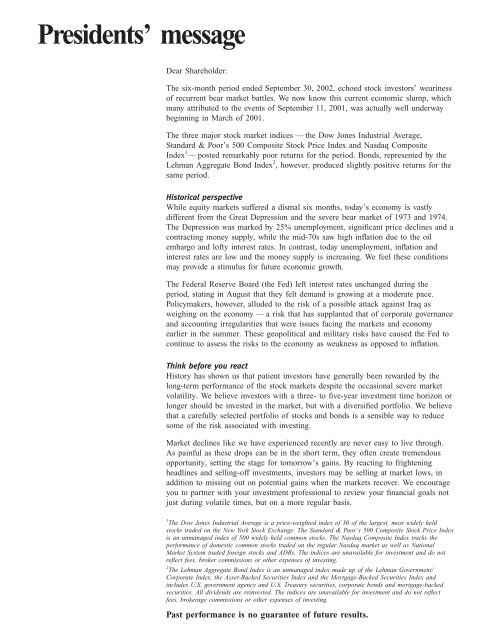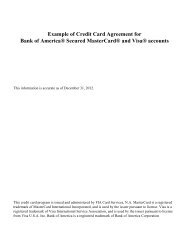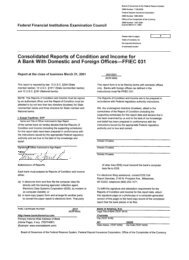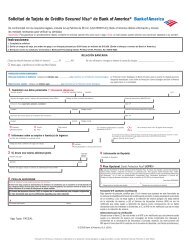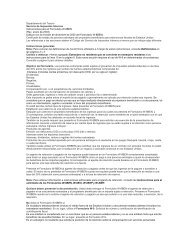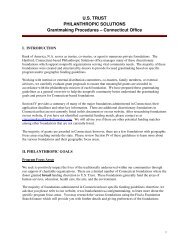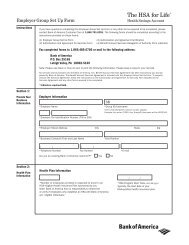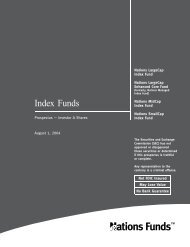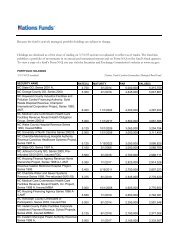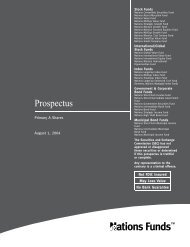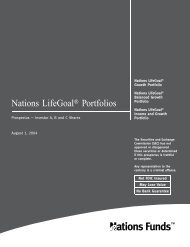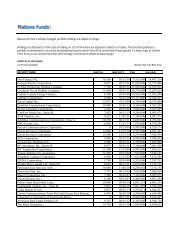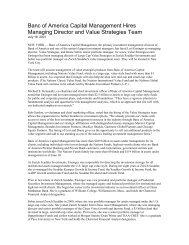Government & Corporate Bond Funds
Government & Corporate Bond Funds
Government & Corporate Bond Funds
Create successful ePaper yourself
Turn your PDF publications into a flip-book with our unique Google optimized e-Paper software.
Presidents’ message<br />
Dear Shareholder:<br />
The six-month period ended September 30, 2002, echoed stock investors’ weariness<br />
of recurrent bear market battles. We now know this current economic slump, which<br />
many attributed to the events of September 11, 2001, was actually well underway<br />
beginning in March of 2001.<br />
The three major stock market indices — the Dow Jones Industrial Average,<br />
Standard & Poor’s 500 Composite Stock Price Index and Nasdaq Composite<br />
Index 1 — posted remarkably poor returns for the period. <strong>Bond</strong>s, represented by the<br />
Lehman Aggregate <strong>Bond</strong> Index 2 , however, produced slightly positive returns for the<br />
same period.<br />
Historical perspective<br />
While equity markets suffered a dismal six months, today’s economy is vastly<br />
different from the Great Depression and the severe bear market of 1973 and 1974.<br />
The Depression was marked by 25% unemployment, significant price declines and a<br />
contracting money supply, while the mid-70s saw high inflation due to the oil<br />
embargo and lofty interest rates. In contrast, today unemployment, inflation and<br />
interest rates are low and the money supply is increasing. We feel these conditions<br />
may provide a stimulus for future economic growth.<br />
The Federal Reserve Board (the Fed) left interest rates unchanged during the<br />
period, stating in August that they felt demand is growing at a moderate pace.<br />
Policymakers, however, alluded to the risk of a possible attack against Iraq as<br />
weighing on the economy — a risk that has supplanted that of corporate governance<br />
and accounting irregularities that were issues facing the markets and economy<br />
earlier in the summer. These geopolitical and military risks have caused the Fed to<br />
continue to assess the risks to the economy as weakness as opposed to inflation.<br />
Think before you react<br />
History has shown us that patient investors have generally been rewarded by the<br />
long-term performance of the stock markets despite the occasional severe market<br />
volatility. We believe investors with a three- to five-year investment time horizon or<br />
longer should be invested in the market, but with a diversified portfolio. We believe<br />
that a carefully selected portfolio of stocks and bonds is a sensible way to reduce<br />
some of the risk associated with investing.<br />
Market declines like we have experienced recently are never easy to live through.<br />
As painful as these drops can be in the short term, they often create tremendous<br />
opportunity, setting the stage for tomorrow’s gains. By reacting to frightening<br />
headlines and selling-off investments, investors may be selling at market lows, in<br />
addition to missing out on potential gains when the markets recover. We encourage<br />
you to partner with your investment professional to review your financial goals not<br />
just during volatile times, but on a more regular basis.<br />
1<br />
The Dow Jones Industrial Average is a price-weighted index of 30 of the largest, most widely held<br />
stocks traded on the New York Stock Exchange. The Standard & Poor’s 500 Composite Stock Price Index<br />
is an unmanaged index of 500 widely held common stocks. The Nasdaq Composite Index tracks the<br />
performance of domestic common stocks traded on the regular Nasdaq market as well as National<br />
Market System traded foreign stocks and ADRs. The indices are unavailable for investment and do not<br />
reflect fees, broker commissions or other expenses of investing.<br />
2<br />
The Lehman Aggregate <strong>Bond</strong> Index is an unmanaged index made up of the Lehman <strong>Government</strong>/<br />
<strong>Corporate</strong> Index, the Asset-Backed Securities Index and the Mortgage-Backed Securities Index and<br />
includes U.S. government agency and U.S. Treasury securities, corporate bonds and mortgage-backed<br />
securities. All dividends are reinvested. The indices are unavailable for investment and do not reflect<br />
fees, brokerage commissions or other expenses of investing.<br />
Past performance is no guarantee of future results.


